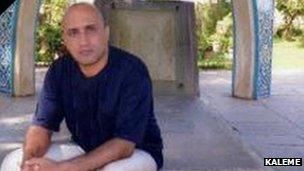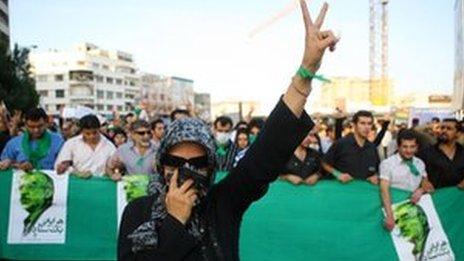Iranian blogger Beheshti 'may have died of shock'
- Published

Signs of wounds were reportedly found on Mr Beheshti's body
Iranian prosecutors say the death of blogger Sattar Beheshti in police custody may have been due to "excessive psychological stress".
Mr Beheshti died after being held on charges of "actions against national security on social networks".
Following his arrest on 30 October, he was handed to police for interrogation and died on 3 November.
The exact circumstances of his death remain unclear. Some reports have suggested he was tortured.
The Tehran prosecutor's office says the main cause of Mr Beheshti's death could be physical shock - caused by the brute force applied to sensitive parts of his torso - or psychological pressure.
"It is not possible to determine the exact cause of death," it said in a statement quoted by Irna news agency. "But the most likely cause leading to death may be shock."
'Signs of wounds'
The statement notes that a thorough forensic investigation has been carried out and that prosecutors have obtained witness statements from Mr Beheshti's inmates and prison wardens.
Neither the statements nor the forensic results are in the public domain.
An earlier coroner's report said his body had "signs of wounds" but no broken bones, according to the semi-official news agency Mehr.
Mr Beheshti's death sparked an international outcry. Last week, three people were reported to have been arrested and subsequently, according to an opposition website, released.
According to opposition website, Kalameh, the suspects had been involved in Mr Beheshti's interrogation.
Mr Beheshti's mother has been forbidden to speak to the press. But an opposition website quoted her as saying she had been offered "blood money" in compensation.
She added: "I said I didn't want any. What I want is for the world to know that they killed my son. They killed Sattar."
It is thought Mr Beheshti was targeted for his writings on political and social issues on his blog and on Facebook.
The blogger spent one night in Tehran's notorious Evin prison on 30 October, where he wrote an official complaint to prison authorities alleging ill-treatment, before being moved to an unknown location.
His death provoked criticism from politicians and human rights groups, Amnesty International said Mr Beheshti had complained of being threatened the day before his arrest.
- Published13 November 2012
- Published28 February 2012

- Published14 October 2024
